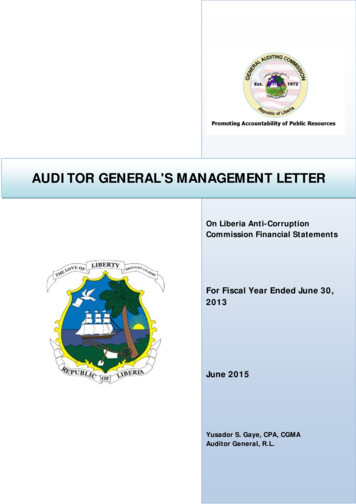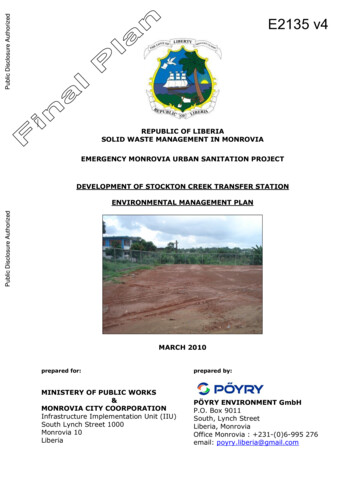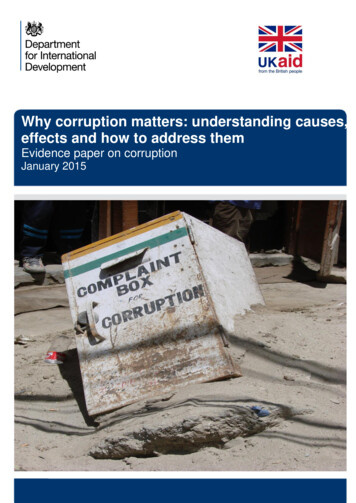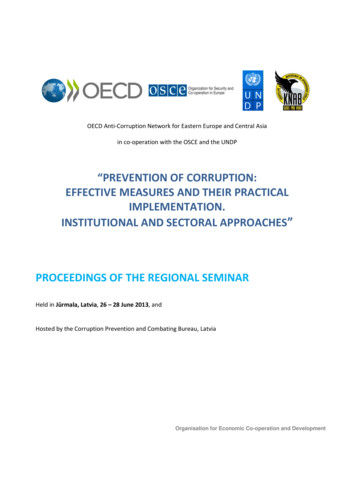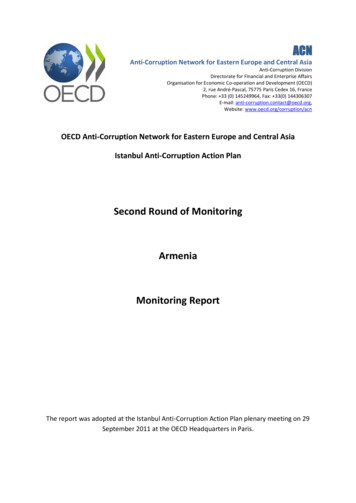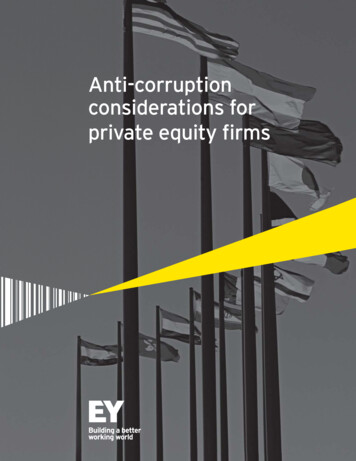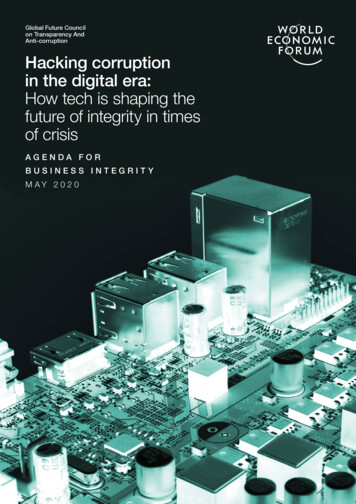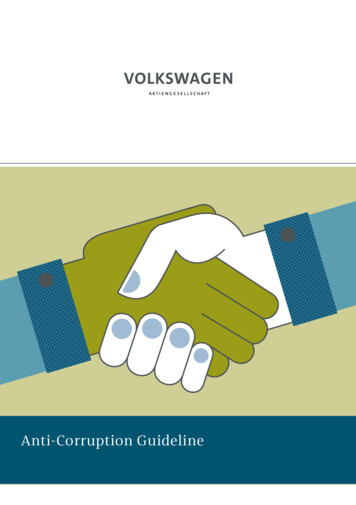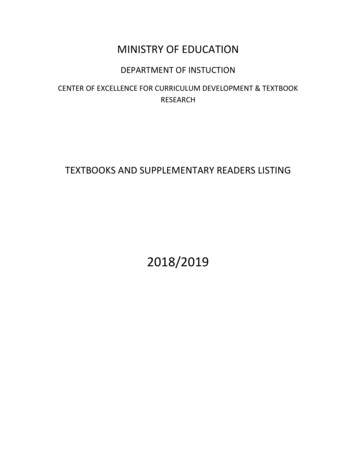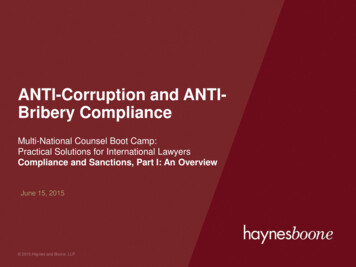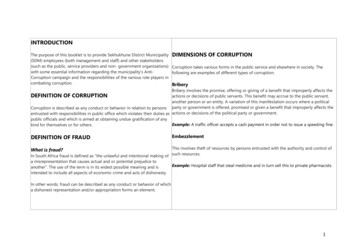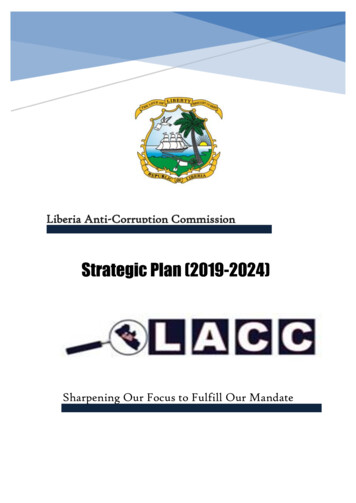
Transcription
Liberia Anti-Corruption CommissionStrategic Plan (2019-2024)Sharpening Our Focus to Fulfill Our Mandate
Liberia Anti-Corruption CommissionStrategic Plan (2019-2024)Table of ContentsACKNOWLEDGEMENT . 3ABBREVIATION AND LIST OF ACRONYMS . 4FOREWORD . 6EXECUTIVE SUMMARY . 8CHAPTER ONE: INTRODUCTION . 121.1 About the Strategic Plan . 121.2 Process in Developing the Strategic Plan . 121.3 Strategic Framework of LACC . 121.4 Strategic Direction of the Five-Year Plan . 14CHAPTER TWO: THE ANTI-CORRUPTION CONTEXT . 182.1 The National Operating Context . 182.2 The Enablers (Stimuli) . 182.3 Functional Challenges . 192.4 Strategic/Policy Risk Factors . 202.5 Institutional Capacity of LACC . 202.5.1 Performance Review of LACC past Strategic Plan (2014-2018) . 20CHAPTER THREE: STRATEGIC ANALYSES . 253.1 Analytical Tools . 253.2.Analysis of Strategic Issues and Implementation Programming . 25CHAPTER FOUR: TECHNICAL ASPECTS/FUNCTIONALITIES . 30A3 Situation Overview, Outcome, Strategic Plan Objectives. 30A7 Intervention Matrix . 32A7 Key Success Factors . 32A9 Actors and Agents of Change . 34B3 Situation Overview, Outcome, and Strategic Objectives . 35B7 Intervention Matrix . 37B8 Key Success Factors . 38B9 Strategies and Processes of Change. 38B9 Actors and Agents of Change . 39The Legal Division will foster partnership and collaboration with major stakeholders as follows: 39C3 Situation Overview, Outcome, and Strategic Objectives . 40C7. Implementation Matrix . 42C7 Key Success Factors . 43C8.1 Front Service Functions . 431 Sharpening Our Focus to Fulfill Our Mandate
Liberia Anti-Corruption CommissionStrategic Plan (2019-2024)C9 Actors and Agents of Change. 44D3 Situational Overview, Outcome, and Strategic Objectives. 45D7 Intervention Matrix. 47D8 Key Success Factors . 48D9 Strategies and Processes of Change . 49D9.2 Front Service Functions . 50D10. Actors and Agents of Change . 50CHAPTER FIVE: IMPLEMENTATION AND MANAGEMENT ARRANGEMENT . 515.1. Operational Strategies, Plans, and Work Systems . 515.2.Performance Management and Appraisal Systems . 525.2.1. Coordination System . 525.2.3.Monitoring, Evaluation, Accountability, and Learning. 52CHAPTER SIX: RESOURCES REQUIREMENT AND MOBILIZATION . 536.1 Resource Requirement . 536.2 Resource Mobilization Strategy . 536.2.1 Business Case for Increased Support from GoL . 536.2.2 Development Partners’ Support . 536.2.3 Partnering with Stakeholders. 53APPENDIX 1 . 54A. IMPLEMENTATION PLAN . 542 Sharpening Our Focus to Fulfill Our Mandate
Liberia Anti-Corruption CommissionStrategic Plan (2019-2024)ACKNOWLEDGEMENTIn order to establish and give us a sense of direction for the coming five years, we have formulatedthis ‘Strategic Plan’. The plan is intended to sharpen our focus in helping us achieve our overallmandate.The efforts and success of this initiative wouldn’t have been possible had we not received thesupport of our partners who played tremendous role in this process. We remain forever grateful tothe Government and people of the United States of America through USAID sponsored project –the Legal Professional Development and Anti-Corruption Programme in Liberia (LPAC) for thetremendous partnership and its support. LPAC has continued to provide technical and logisticalsupport to the LACC in enhancing its work. The work of the ‘Strategic Plan’ team was madepossible through the sponsorship of LPAC.In addition, the United Nations Development Programme (UNDP) continues to significantly supportand strengthen the programs of the Commission through its STAOP Project. The project’s supportis basically focused on the provision of logistics and boosting the work of the Enforcement, Legal,and Education and Prevention Divisions which is very critical to the sustenance of the Commission.The support of the Open Society Initiative for West Africa (OSIWA) in our educational billboardand signpost project is remarkable. The unflinching contributions of other partners, including theCivil Society Organizations (CSOs), the Media and the National Integrity Forum (NIF) are fantastic.The contribution of staff of the LACC, including the Body of Commissioners (BoC) in the fruition ofthis project is marvellous. Their enduring commitment in the drafting, editing and finalization of thiswork culminated in the realization of this endeavour.We finally remain grateful to LPAC’s Strategic/Functional Consultant, Mr. Charles G. Tiah for histime and patience demonstrated for the success of this exercise. The input of everyone isappreciated.Atty. Mohammed E. FahnbullehEXECUTIVE DIRECTOR3 Sharpening Our Focus to Fulfill Our Mandate
Liberia Anti-Corruption CommissionStrategic Plan (2019-2024)ABBREVIATION AND LIST OF can Union Convention on Anti-Corruption2AfDBAfrican Development Bank3ABCAttitudinal and Behavioral Change4BOCBody of Commissioners5CSOsCivil Society Organizations6DOPDivision Operation Plan7EUEuropean Union8EDExecutive Director9FIUFinancial Intelligence Unit10FBOsFaith-Based Organizations11GoLGovernment of Liberia12GCGovernance Commission13GACGeneral Auditing Commission14GEMAP15HRGovernance and Economic Management AssistanceProgrammeHuman Resource16HCAHuman Capital Advantage17HRAHuman Resource Advantage18HRMHuman Resource Management19IADInternational Anti-Corruption Day20IAAInternal Auditing Commission21IEC/BCC22KPIInformation, Education, Communication and Behavior ChangeCampaignKey Performance Indicators23LACCLiberia Anti-Corruption Commission24LEITILiberia Extractive Industry Transparency Initiative25LPACLegal Professional Development and Anti-Corruption26LNPLiberia National Police27LRALiberia Revenue Authority28LRCLaw Reform Commission29MACsMinistries, Agencies, and Commissions4 Sharpening Our Focus to Fulfill Our Mandate
Liberia Anti-Corruption CommissionStrategic Plan nistry of Justice31MOFDPMinistry of Finance and Development Planning32MAPManagement Action Plan33MEALMonitoring, Evaluation, Accountability, and Learning34MSCMost Significant Change35MCFsMost Crucial Factors36NASNational Anti-Corruption Strategy37NIFNational Integrity Forum38ODAOversea Development Assistance39OSIWAOpen Society of West Africa40PAPDPro-Poor Agenda for Prosperity and Development41PMsProgramme Managers42PPCCPublic Procurement Concession Commission43PMEPerformance Management and Evaluation44PDIAProblem-Driven Iterative Adaptation45QWPQuarterly Work Plan46R&TResearch and Technical47SIDASwedish International Development Agency48SOPsStandard Operating Procedures49SICsStudent Integrity Clubs50SWOTStrengths, Weaknesses, Opportunities, and Threats51SPStrategic Plan52SPIsStandard Performance Indicators53SAStrategic Analysis54TITransparency International55TATechnical Assistance56Triple AAcceptance, Ability, and Authority57ToRsTerms of Reference58UNCACUnited Nation Convention on Anti-Corruption59USAIDUnited States Agency for International Development60UNDPUnited Nations Development Programme5 Sharpening Our Focus to Fulfill Our Mandate
Liberia Anti-Corruption CommissionStrategic Plan (2019-2024)FOREWORDGlobally, corruption is characterized as a complex social, political and economic phenomenon thataffects all countries. Corruption undermines democratic institutions, slows economic developmentand contributes to governmental instability. Corruption attacks the foundation of democraticinstitutions by distorting electoral processes, perverting the rule of law and creating bureaucraticquagmires whose only reason for existing is the soliciting of bribes. Economic development isstunted because foreign direct investment is discouraged and small businesses within the countryoften find it impossible to overcome the "start-up costs" required because of corruption.The Government of Liberia (GOL) has continued to formulate and adopt new regulations andmeasures aimed at strengthening laws and policies that adequately address the peculiar nature ofcorruption in society. These efforts have culminated in the Government declaring corruption as“public enemy number one”. The setting up of the Liberia Anti-Corruption Commission (LACC)was a big and motivating step in battling this epidemic which has become a way of life. Truly andevidenced to its commitment, Government adopted a National Anti-Corruption Strategy (NAS) ledby the Governance Commission (GC) in partnership with civil society. The Government alsostrengthened the General Auditing Commission (GAC), Public Procurement and ConcessionsCommission (PPCC), the Liberia Extractive Industry and Transparency Initiative (LEITI), the InternalAudit Agency (IAA), the Financial Intelligence Unit (FIU), the Liberia Revenue Authority (LRA), theLaw Reform Commission (LRC) and the Independent Information Commission (IIC). Theseinterventions in part fulfil Liberia’s obligations under international treaties and conventions, includingthe United Nations Convention against Corruption (UNCAC), to which Liberia is a signatory andstate-party.Meanwhile, from the time the LACC was established some nine years ago, it has made significantprogress in the fulfilment of its core mandates - education and prevention, and investigation andprosecution. The Commission has been able to adopt several measures and institutionalized policiesintended to strengthen the fight against this menace. During the period, the LACC has hired andcontinues to hire relevant professional staff, drafted and ratified operational instruments; andinvestigated and prosecuted several cases of corruption. The progress made was achieved underdifficult situation, including inadequate financial and material resources.The area of prosecution seems to generate public interest as compared to education andprevention. This is largely due to the culture of impunity which long permeated our society. Buttoday, serious efforts have been ignited in prosecuting persons accused of corruption despite thesurmountable financial challenges in recruiting additional investigators, lawyers and acquisition oflogistics to facilitate the work of the Commission.LACC is so tedious and challenging. The LACC has a difficult mission. The Commission is engulfedwith a daunting responsibility to restore integrity and accountability in the public sector. Hence, theformulation of this five-year “Strategic Plan” is the outcome of our farsightedness and honest desireto realistically pursue and implement the mandate of the LACC for the next five years that will6 Sharpening Our Focus to Fulfill Our Mandate
Liberia Anti-Corruption CommissionStrategic Plan (2019-2024)make the Commission more responsive to the needs and aspirations of the Liberian people andpartners. Transparency, accountability and integrity shall be the hallmark of this mission.The implementation of this plan will require collaborative efforts and the involvement of allstakeholders, comprising relevant institutions, civil society and the citizenry. As we anticipate theimplementation of this plan, it is our hope that we will receive the necessary support from theGovernment and people of Liberia, our international partners, civil society, the media and theprivate sector. This plan is a vision to move the LACC in a positive direction in stimulating thenational fight against corruption. We are convinced that with the support of all, we will succeed.Charles J. L. Gibson, IIIOFFICER-IN-CHARGE7 Sharpening Our Focus to Fulfill Our Mandate
Liberia Anti-Corruption CommissionStrategic Plan (2019-2024)EXECUTIVE SUMMARY1. OverviewThe Liberia Anti-Corruption Commission (LACC) is one of the major autonomous bodies/ agenciesestablished to foster and promote a corruption-free society that advances transparency, integrityand accountability in Liberia. The mandate of LACC- to investigate, deter and prosecute acts ofcorruption, promote good governance and the rule of law, strategically positions the Commissionto contribute towards promoting probity and accountability in both the public and private sectors .This new strategic plan sharpens LACC’s focus and approach in pursuing its mandate. The Planemployed the value-based, issue-based, organic-based, and goal-based methods and utilized morethan nine strategic tools to conduct external and internal environmental scans.2. Major Achievements by LACCDuring the performance period of LACC’s previous Strategic Plan (2014 to 2017), twenty ninecases were concluded, representing 93.10 percent gallop in performance (from 2 concluded casesduring the previous performance period (before 2014-to this one). It also represents 12.08 percentof a total of 240 cases reported. Similarly, a noticeable seven cases or 24.13 percent of the total 29cases investigated, concluded, and forwarded were being prosecuted. Additionally, a whistle blowerbill was drafted and presented to the Legislature for passage into law.Of the cases prosecuted, two individuals pleaded guilty to corruption charges and restitution offunds is being enforced at the Circuit Court; but no conviction has yet been achieved at theSupreme Court in cases that were earlier convicted at Circuit Courts. These cases are still stalledat the high court awaiting final judgment. Meanwhile, restitutions were also made in other casessuch as Aminata, a petroleum company, Mohammed Paasewe, former Superintendent of GrandCape Mount County, Amos Tweah, former Assistant Minister, MICAT, Abu Kamara, formerAssistant Minister for Administration, Ministry of Postal Affairs, and Hassen Kiadi, formerProcurement Officer, Grand Cape Mount County. With respect to Education and Prevention, theCommission has conducted a number of public outreach campaigns and is facilitating the operationof Students Integrity Clubs in 19 public schools in Liberia with a focus of addressing systemiccorruption in secondary schools.3. Major ChallengesThe Liberia Anti-Corruption Corruption Commission has made progress. However, the reality is,several unaddressed challenges continue to outweigh LACC’s current capacity -legal, financial,logistical/material, and technical human resource- to mitigate these demands. Key among thesechallenges include:a. Lack of adequate political will to fight corrupt practices manifests in many ways, including butnot limited to: (i) concerted attacks on anti-graft institutions, including the LACC, by officialsand their agents whenever they are accused of corruption; (ii) the lack of proper andadequate administrative actions against officials accused of or involved in corruption; (iii)unresolved corruption cases;(iv) unending corruption investigations;8 Sharpening Our Focus to Fulfill Our Mandate
Liberia Anti-Corruption CommissionStrategic Plan (2019-2024)b. Failure to enact stronger laws that will strengthen current weak anti-corruption legislations,despite submissions and recommendations from the LACC. The current LACC legalframework limits the Commission from, directly and expeditiously prosecuting corruptioncases. It also limits the Commission from effectively administering its Assets Declaration andVerification regime, as well as to protecting witnesses and whistles blowers.c. Failure on the part of MACs to adequately adhere to the Public Procurement laws andregulations; willingness to hold accountable those who are responsible for the loss of publicfunds and/or misuse of public resources; and corrupt practices that adjust to manipulate newaccountability systems as they arise.d. While the general view is that the public detests corruption, ironically, directly andindirectly, the populace encourages it. Moreover, citizens seem to identify and speak ofcorruption only in terms of politics and acts of corruption associated with public officials andoperatives.In view of the above, inadequate financial and administrative support for the LACC has resulted to anumber of demands faced by the Commission, which outweigh its current financial, humanresources, material, and legal capacities to respond more effectively.e. Strategic DirectionAligned to the Pro-poor Agenda for Development and Prosperity, this plan strategically positionsLACC to lead the fight against corruption more effectively and to maximize its resources throughthe making of smart and potentially more rewarding choices in fighting corruption in Liberia.LACC’s Overall Goals are to:1. Prevent, deter, and prosecute acts of corruption among 1.5 million citizens across Liberia throughpublic education, institution of effective corruption prevention systems in 40% of public institutions,investigation and conclusion of at least 100 corruption cases and prosecution of 30% of concludedcases, and recover proceeds/assets from acts of corruption; and2. Elevate the fight against corruption to the fore front of Liberia’s development agenda, drivingit as a key vehicle in preventing development inequalities; mobilize support to strengthenexisting anti-corruption policies, laws and instruments and to adequately resource LACC’soperational functions.Broadly, LACC will achieve the above goals through its four operational and administrative divisions, and incooperation with strategic stakeholder groups. Through the divisions of Education and Prevention,Enforcement, Legal and Administration, the Commission and stakeholders will:A. PREVENT ACTS OF CORRUPTION: Establish and work in collaboration with relevantstakeholders to promote adherence to systems for the prevention of systemic corruption in MACs;monitor and draw attention to violations of laws and regulations (mainly through annualperformance report) and conduct public education targeting at least 1.5 million Liberians to promoteeconomic prosperity, effective economic inclusion, and prevent social and civil tensions.9 Sharpening Our Focus to Fulfill Our Mandate
Liberia Anti-Corruption CommissionStrategic Plan (2019-2024)B. INVESTIGATE ACTS OF CORRUPTION: Investigate and conclude at least 100 percentcorruption cases in service-intensive, revenues/resource-based, and regulatory-driven ministries,agencies, and commissions (MACs) to promote financial governance and accountability for sharedprosperity and sustainable development in Liberia.C. PROSECUTE AND DETER ACTS OF CORRUPTION: Modify the legal framework of LACCwith attention to: enactment of laws for direct prosecutorial power and the establishment ofspecialised court; prosecute increased number of corruption cases, mainly systemic corruption inservice-intensive, revenues/resource-based, and regulatory-driven ministries, agencies, andcommissions (MACs) and recover assets/proceeds from acts of corruption to promote a accountablepublic sector and reduce development inequalities.D. PROVIDE LEADERSHIP TO REDUCE CORRUPTION: Increase the overall operationaleffectiveness of the LACC and diversify its resource base to expand its services to all regions ofLiberia and to adequately support operational activities of front-service divisions throughstrengthening of the Commission’s internal organizational processes, enhancing cost leadership,establishing a differentiated and sustained pool of resources (various streams of funding,competence and productivity-based HR and relevant non-human performance systems) to reduceacts of corruption.1. Resources RequirementThe resources required, in dollars value, to implement the plan is US 36,324,177, summarisedbelow:Tabular Summary of Resource Requirement (see chapter five)NoProgram/Operations%Personnel%Total%Sources of ntage Distribution of Required Funds Between LACC & Partners51.5048.502. Implementation and Management ArrangementsThe Strategic Plan will be implemented at two levels: policy and functional. At the policy level, theLACC’s Body of Commissioners (BOC) will oversee the implementation of the Plan. Tooperationalize the plan, the BOC will facilitate the development of strategies and policies that arerelevant to or aligned to all crucial aspects of LACC. These strategies/policies will include: a)resource mobilization strategy; b) competence and productivity-based HR strategy; c) partnership10 S h a r p e n i n g O u r F o c u s t o F u l f i l l O u r M a n d a t e
Liberia Anti-Corruption CommissionStrategic Plan (2019-2024)development and management strategy; d) Organization Culture and Development Policy; e)Operational Planning and Management SOPs; and f) Monitoring Evaluation Accountancy andLearning system. Relevant systems, processes, and procedures will be developed consistent with thenature of the policies, strategies or frameworks. These strategy documents, along with relatedsystems will be implemented at the level of the Divisions.At the functional level, the plan will be implemented through an annual Management Action Plan(MAP), broken down into quarterly operational plan (QOP), and monthly work plans. At theDivisional level, each Division will develop a Division Operation Plans (DOPs) which will feed intothe MAP. In order to effectively and efficiently implement LACC’s socio-technical system, theCommission will establish relevant cross-departmental work teams; promote cohesive work teams,healthy interpersonal relationships, and create the organizational climate needed.The BOC will track performance targets monthly/quarterly and will review the SP annually. Eachyear, strategic plan-specific performance review and progress report will be prepared. Relevant tomonitoring evaluation accountability and learning, performance indicators will be tracked at threelevels; namely: Outcomes, Objectives, and Intervention Outputs in keeping with the standardperformance indicators in the plan. At the Strategic Objectives and Outcomes level, monitoring willfocus on gathering evidence of any early results that indicate change is taking place in the conditionsagainst which interventions were developed. Performance tracked will be compared to baselinesestablished in this Strategic Plan.11 S h a r p e n i n g O u r F o c u s t o F u l f i l l O u r M a n d a t e
Liberia Anti-Corruption CommissionStrategic Plan (2019-2024)CHAPTER ONE: INTRODUCTION1.1 About the Strategic PlanThe endemic nature of corruption in Liberia threatens the economic and social development of thecountry and challenges all Liberians and integrity institutions, including the LACC, to do more tostrengthen and expand the fight against this menace. This fact is the most important basis forengaging in the strategic thinking and planning exercises that has led to the development of this FiveYear Strategic Plan. The technical assistance from the Liberia Legal Professional Development andAnti-Corruption(LPAC), a United States Agency for International Development (USAID)-fundedproject implemented by Checchi and Company Consulting, Inc., was solicited to develop thisStrategic Plan. Meanwhile, the entire process was driven by LACC administrative and technical staff,allowing for experience sharing, action and experiential learning, and ownership. The strategic planwill span from July 2019 to June 2024.1.2 Process in Developing the Strategic PlanThe methods utilized to develop this plan encompass the value-based, issues-based, organic-based,and goal-based approaches to strategic planning (see chapter three). To this effect, more than ninestrategic analysis tools were used, including value-chain, stakeholders, forced field, and SWOT(strengths, weaknesses, opportunities, and threats) analytical tools. Particularly, the processes ofdeveloping the plan comprise four phases; namely: Phase One: Organization of Strategic Planning Team and Development of Strategic AnalysisTools Phase Two: Strategic Analysis Sessions and In-depth Analysis of Strategic Issues Phase Three: Implementation Programming and Functionality Design Phase Four: Technical Review, Editing, and Validation of the Plan1.3 Strategic Framework of LACCThe Government of Liberia declared corruption a "public enemy number one” in January 2006 inresponse to the endemic nature of corruption which continued to undermine the institutionalframework of good governance and economic prosperity. Consequently, it adopted a National AntiCorruption Strategy in 2006, followed by the establishment of an autonomous and independentLiberia Anti-Corruption Commission (LACC) on August 28, 2008. Particularly, the strategicframework of LACC consists of: a mandate, vision, mission, mission objectives, values, and coreprograms, as described below:A. Mandates of LACCThe “LACC Act of 2008” establishing the Commission gives it the broad mandate and functions toimplement appropriate measures and undertake programs geared toward investigating, prosecutingand preventing acts of corruption in both the public and private sectors of the Liberian society,including educating the public about the ills of corruption and the benefits of its eradication.12 S h a r p e n i n g O u r F o c u s t o F u l f i l l O u r M a n d a t e
Liberi
Meanwhile, from the time the LACC was established some nine years ago, it has made significant progress in the fulfilment of its core mandates - education and prevention, and investigation and prosecution. The Commission has been able to adopt several measures and institutionalized policies intended to strengthen the fight against this menace.
